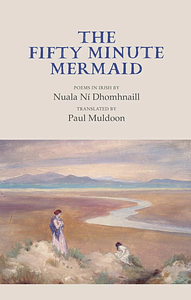You need to sign in or sign up before continuing.
Take a photo of a barcode or cover
Wonderful and weird collection of stories about Irish meremaids, their lives, politics etc. The Irish is very very beautiful and the translation is very well done. If you have a little Irish, I recommend that you look at the best parts of a poem / story in the Irish. It makes the experience even better.
4 Stars
4 Stars
I love Nuala's writing (or Paul Muldoon's translation of Nuala's writing) . It's whimsical, poignant, magical and real at the same time. There are very few books that I have read in school and have felt that that environment elevated the reading, but I am so glad I read this in a school setting. This book is a book to read and the talk about it with other people.
Dhomhnaill's object of study seems to be both the mermaid as myth and the mermaid as matter. This paradoxical stance makes mermaids both elusive and present to the speaker and--by extension--the reader. We don't know what is real but we find signs of the mermaids without water everywhere.
The best part of the collection is the way Dhomhnaill summons nostalgia; I found myself missing a sea I have never known and an ontology I've never experienced.
The best part of the collection is the way Dhomhnaill summons nostalgia; I found myself missing a sea I have never known and an ontology I've never experienced.
My main issues with this collection were the translations. Unfortunately, I feel like the translator altered the essence of the poems and the writing style for the worse. I would have enjoyed this a lot more if I had better Irish and could rely solely on the originals, as even with my mediocre language skills I could appreciate that the original poems had a lot more to offer and the translations unfortunately lost a lot of the beauty and the inherent style of the poems.
At times the original poem would have simplistic language, that the translator would overcomplicate, or worse he would add in elements that were not in the original poem. For example, in the poem ‘Cuimhne an Uisce,’ the original says “her daughter” (a hiníon), which the translator decided to translate as “the mermaid’s daughter,” even though the original poem does not once mention the mermaid. I can appreciate that things by nature are lost in translation, however I feel in this case the poems have been overtaken by the translator’s personal artistic vision.
Despite these issues, there were several really beautiful poems in the collection that have made their way into my favourites, definitely a collection I will return to in the future when I pick back up the language and can hopefully disregard the translations completely.
At times the original poem would have simplistic language, that the translator would overcomplicate, or worse he would add in elements that were not in the original poem. For example, in the poem ‘Cuimhne an Uisce,’ the original says “her daughter” (a hiníon), which the translator decided to translate as “the mermaid’s daughter,” even though the original poem does not once mention the mermaid. I can appreciate that things by nature are lost in translation, however I feel in this case the poems have been overtaken by the translator’s personal artistic vision.
Despite these issues, there were several really beautiful poems in the collection that have made their way into my favourites, definitely a collection I will return to in the future when I pick back up the language and can hopefully disregard the translations completely.
reflective
I first read these poems a few years ago and I think about / revisit them frequently. An absolutely gorgeous collection.
funny
hopeful
inspiring
reflective
fast-paced
Moderate: Pedophilia



